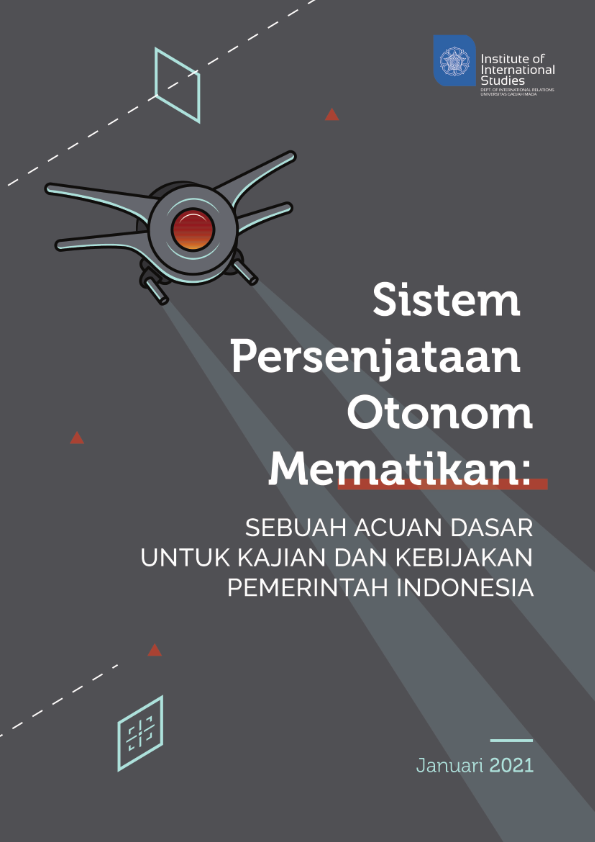On Thursday, April 29 2021, the Damai Pangkal Damai team, a database project on nonviolent action in Indonesia, alongside with Institute of International Studies UGM, held an online seminar on nonviolent action titled “Barangsiapa Meninggalkan Kekerasan…” (Whoever Abandons Violence).
Pada Kamis, 29 April 2021 lalu, tim Damai Pangkal Damai, badan pangkalan aksi nirkekerasan di Indonesia, bersama dengan Institute of International Studies UGM menyelenggarakan Webinar Perlawanan Nirkekerasan bertajuk “Barangsiapa Meninggalkan Kekerasan…”.
Jumat (23/04) lalu, Institute of International Studies, Universitas Gadjah Mada (IIS UGM) menyelenggarakan Forum Diskusi Beyond The Great Wall (BTGW) edisi ke-14.
On Friday March 19th, the Institute of International Studies, Universitas Gadjah Mada (IIS UGM), held the second edition of the Cangkir Teh discussion virtually using Zoom Meetings.
Jumat (19/03) Institute of International Studies, Universitas Gadjah Mada (IIS UGM) menyelenggarakan diskusi Cangkir Teh edisi kedua secara virtual melalui platform Zoom Meetings.
On Friday (26/02), Institute of International Studies UGM organized the 13th edition of Beyond the Great Wall Forum, titled “China and Maritime Sovereignty”.
Jumat (26/02), Institute of International Studies UGM menyelenggarakan forum “Beyond the Great Wall” edisi ke-13 yang bertajuk “Cina dan Kedaulatan Maritim”. Forum diselanggarakan secara daring melalui media Zoom Meetings.
Edisi perdana Cangkir Teh pada tahun 2021 telah diselenggarakan pada hari Senin 22 Februari 2021, dan merupakan hasil kerjsama Institute of International Studies, Universitas Gadjah Mada (IIS UGM) dengan Tim Damai Pangkal Damai (DPD).
The first Cangkir Teh discussion was held on Monday, February 22nd 2021. The discussion was a collaborative effort between the Institute of International Studies, Universitas Gadjah Mada (IIS UGM) and Damai Pangkal Damai Team (DPD).
Sistem Senjata Otonom Mematikan : Sebuah Acuan Dasar Untuk Kajian Dan Kebijakan Pemerintah Indonesia
[av_one_half first min_height=” vertical_alignment=’av-align-top’ space=” row_boxshadow=” row_boxshadow_color=” row_boxshadow_width=’10’ custom_margin=” margin=’0px’ mobile_breaking=” border=” border_color=” radius=’0px’ padding=’0px’ column_boxshadow=” column_boxshadow_color=” column_boxshadow_width=’10’ background=’bg_color’ background_color=” background_gradient_color1=” background_gradient_color2=” background_gradient_direction=’vertical’ src=” background_position=’top left’ background_repeat=’no-repeat’ highlight=” highlight_size=” animation=” link=” linktarget=” link_hover=” title_attr=” alt_attr=” mobile_display=” id=” custom_class=” template_class=” aria_label=” av_uid=” sc_version=’1.0′]
[av_image src=’http://iis.fisipol.ugm.ac.id/wp-content/uploads/sites/720/2021/04/Primer-Killer-Robots-IND_001.png’ attachment=’10858′ attachment_size=’full’ copyright=” caption=” styling=” align=’center’ font_size=” overlay_opacity=’0.4′ overlay_color=’#000000′ overlay_text_color=’#ffffff’ animation=’no-animation’ hover=” appearance=” link=” target=” title_attr=” alt_attr=” lazy_loading=’disabled’ id=” custom_class=” template_class=” av_element_hidden_in_editor=’0′ av_uid=’av-kn76cfdy’ sc_version=’1.0′ admin_preview_bg=”][/av_image]
[/av_one_half][av_one_half min_height=” vertical_alignment=’av-align-top’ space=” row_boxshadow=” row_boxshadow_color=” row_boxshadow_width=’10’ custom_margin=” margin=’0px’ mobile_breaking=” border=” border_color=” radius=’0px’ padding=’0px’ column_boxshadow=” column_boxshadow_color=” column_boxshadow_width=’10’ background=’bg_color’ background_color=” background_gradient_color1=” background_gradient_color2=” background_gradient_direction=’vertical’ src=” background_position=’top left’ background_repeat=’no-repeat’ highlight=” highlight_size=” animation=” link=” linktarget=” link_hover=” title_attr=” alt_attr=” mobile_display=” id=” custom_class=” template_class=” aria_label=” av_uid=” sc_version=’1.0′]
[av_image src=’http://iis.fisipol.ugm.ac.id/wp-content/uploads/sites/720/2021/04/Primer-Killer-Robots-EN_001.png’ attachment=’10862′ attachment_size=’full’ copyright=” caption=” styling=” align=’center’ font_size=” overlay_opacity=’0.4′ overlay_color=’#000000′ overlay_text_color=’#ffffff’ animation=’no-animation’ hover=” appearance=” link=” target=” title_attr=” alt_attr=” lazy_loading=’disabled’ id=” custom_class=” template_class=” av_element_hidden_in_editor=’0′ av_uid=’av-kn76clgk’ sc_version=’1.0′ admin_preview_bg=”][/av_image]
[/av_one_half][av_one_full first min_height=” vertical_alignment=’av-align-top’ space=” row_boxshadow=” row_boxshadow_color=” row_boxshadow_width=’10’ custom_margin=” margin=’0px’ mobile_breaking=” border=” border_color=” radius=’0px’ padding=’0px’ column_boxshadow=” column_boxshadow_color=” column_boxshadow_width=’10’ background=’bg_color’ background_color=” background_gradient_color1=” background_gradient_color2=” background_gradient_direction=’vertical’ src=” background_position=’top left’ background_repeat=’no-repeat’ highlight=” highlight_size=” animation=” link=” linktarget=” link_hover=” title_attr=” alt_attr=” mobile_display=” id=” custom_class=” template_class=” aria_label=” av_uid=” sc_version=’1.0′]
[av_textblock size=” av-medium-font-size=” av-small-font-size=” av-mini-font-size=” font_color=” color=” id=” custom_class=” template_class=” av_uid=’av-kn76c5bm’ sc_version=’1.0′ admin_preview_bg=”]
Klik tautan berikut untuk mengunduh file Sistem Senjata Otonom Mematikan : Sebuah Acuan Dasar Untuk Kajian Dan Kebijakan Pemerintah Indonesia [tersedia dalam versi Bahasa Indonesia dan versi Bahasa Inggris] :
http://bit.ly/PrimerKillerRobots
[/av_textblock]
[/av_one_full]
.



